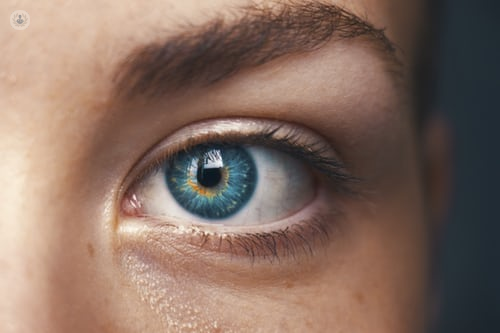What are retinal tear symptoms?
Escrito por:The retina is a layer of tissue that lines the inside of your eye. It’s made up of light-sensitive cells that send signals to your brain, allowing you to see. The retina is quite thin, so a tear in it can be serious and lead to a loss of vision. Ophthalmologist Miss Miriam Minihan talks to us about retinal tears and the common signs that you might have one.

What is a retinal tear?
A retinal tear is a break in the continuity of the retina, the light-sensitive layer at the back of the eye. A retinal tear occurs as a consequence of traction from the vitreous gel in the setting of a posterior vitreous detachment (PVD). PVD is a natural change that occurs during adulthood when the vitreous gel that fills the eye separates from the retina at the back of the eye.
The sequence of events is as follows: the vitreous gel naturally deteriorates with time. At some point, usually in a person’s fifties or sixties, the vitreous gel may separate from the retina at the back of the eye, as the vitreous gel separates it may pull on the retina, creating a retinal tear.
Why is a retinal tear important?
If not treated by a retinal specialist, a retinal tear can cause retinal detachment which can lead to a loss of vision.
What are retinal tear symptoms?
Symptoms are essentially the symptoms of PVD-flashing lights described as an arc, flicker or flash of light usually to the sides of vison and floaters which may be in the form of dark strands, cobwebs, tadpole shapes or tiny dots which move with eye movement.
What should I do if I experience symptoms?
You should seek the opinion of a retinal specialist within 24 hours. You can attend your optometrist for advice as to whether you need to attend a retinal specialist. The specialist can diagnose a retinal tear by examination and proceed to treatment without delay.
What is the treatment for a retinal tear?
Retinal tears are usually treated using laser treatment in an outpatient setting. Occasionally cryotherapy (freeze therapy) may be required. The role of treatment is to prevent retinal detachment.
Are you seeing flashing lights and floaters? Schedule an appointment with a retinal specialist such as Miss Miriam Minihan.


